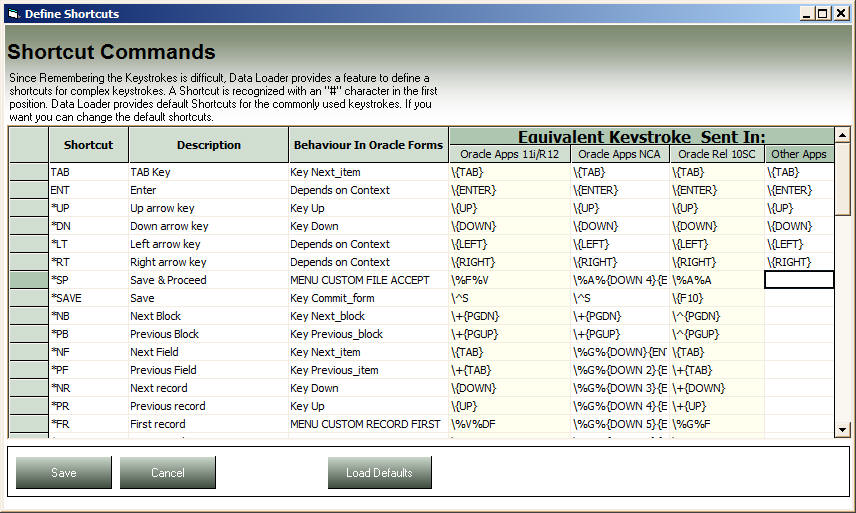Shortcuts / Commands Window Explained
In Macro Loading, one
has to entered a combination of characters for saving a record or to go
to new block etc. This often included entering the special keys like ^
for CTRL key, % for Alt key and + for Shift key along with the other
characters.
For Example to Save a Record in Oracle Forms, we need
to enter CTRL+S and the Keystrokes we need to enter is \^s .
To
simplify this Data Loader lets you define easy to remember Shortcuts also
known as Commands for frequently used keystrokes.
To view and edit the list of Shortcuts (Commands) please click on the Shortcuts button on the Data Loader toolbar as shown below

The Shortcut Window is shown below

By default Data Loader comes with predefined Shortcuts for
different Oracle Application Versions, Such as Oracle EBS Ver. 10.x.x,
Oracle Apps Version 11i, Oracle EBS R12 and Other Applications. For the
list of shortcuts / commands please see
List of
Data Loader Commands / Shortcuts
In addition to the above
you can always define your own shortcuts /commands by entering it in the
Shortcut Window. You can also edit the predefined shortcuts if needed, by
directly editing the contents in the shortcut window.
Whatever
shortcuts you have edited or added will be saved with the Data Loader
Macro Load file (*.dlf) and will be loaded whenever you open the file.
At the time of loading, you can select the application type from
the "Map Shortcuts to Application" drop down list as shown below, so that
data loader can use the shortcuts defined for that application version.

How to define a new shortcut or command in Data Loader
Data Loader comes with several predefined command for frequently used keystrokes there is rarely a need for defining new shortcuts / commands.
However if needed Data Loader also lets you define your own shortcuts. To define a new shortcut / command please click the scrollbar to go the bottom row of the grid, as shown below and start typing in the blank row

All shortcuts in Data Loader should start with an asterisk "*" character. The shortcut / command you are defining should be unique i.e. it should not already exist. You should also enter the equivalent keystroke in the corresponding columns which represents the shortcut. You should enter the keystroke for atleast one Oracle Version. For the list of Keystrokes please see Keystrokes
For Example, suppose we need to define a keystroke *F11 for sending Control+F11 keystroke in Oracle Application R12 / 11i then please do the following

If you have done any mistakes you can always revert back to the original shortcuts / commands by clicking the "Load Defaults" button.
Important Note:
Pressing load defaults button will overwrite any changes you made in the grid. Even those shortcuts you have defined or edited previously also will be overwritten
